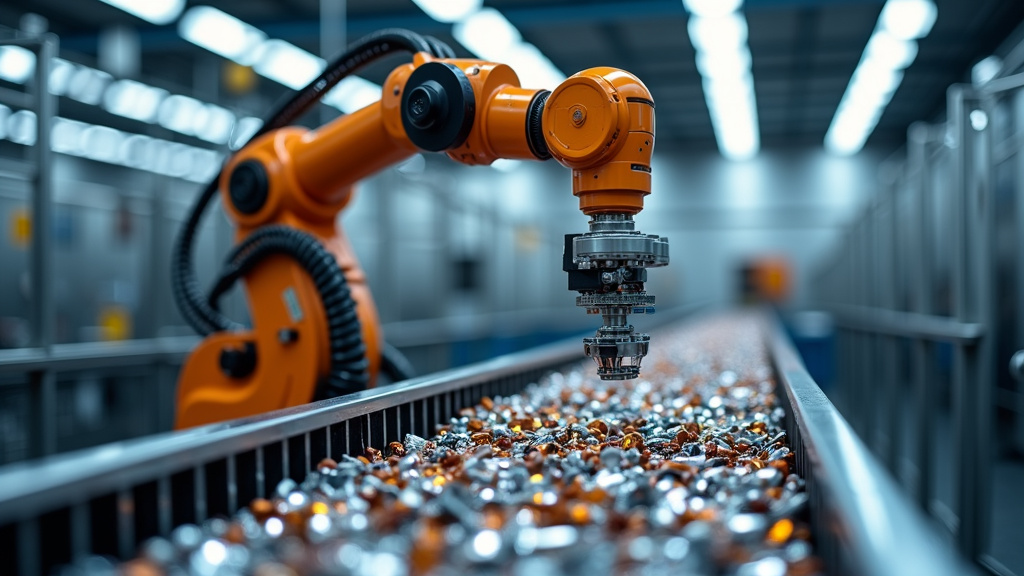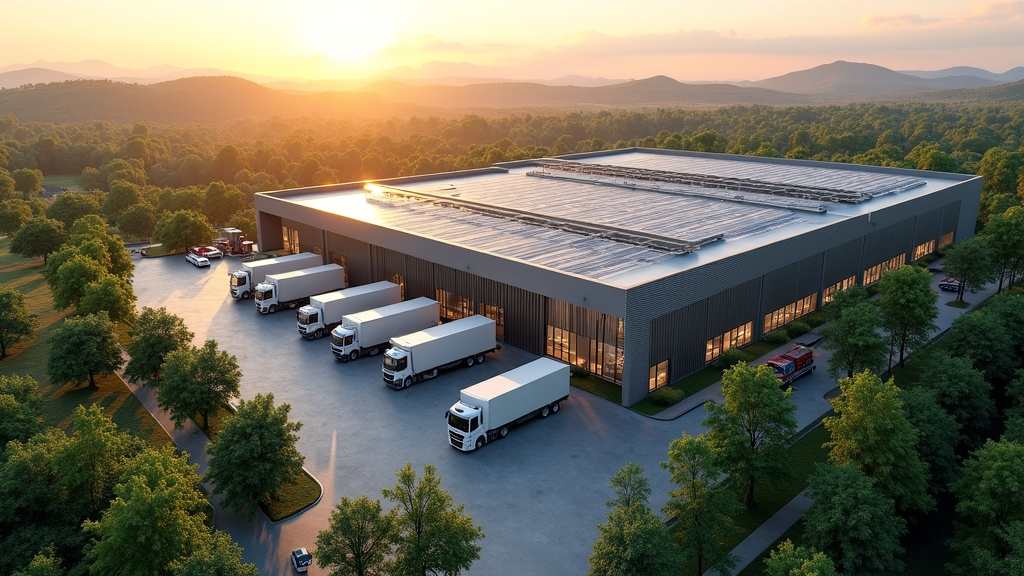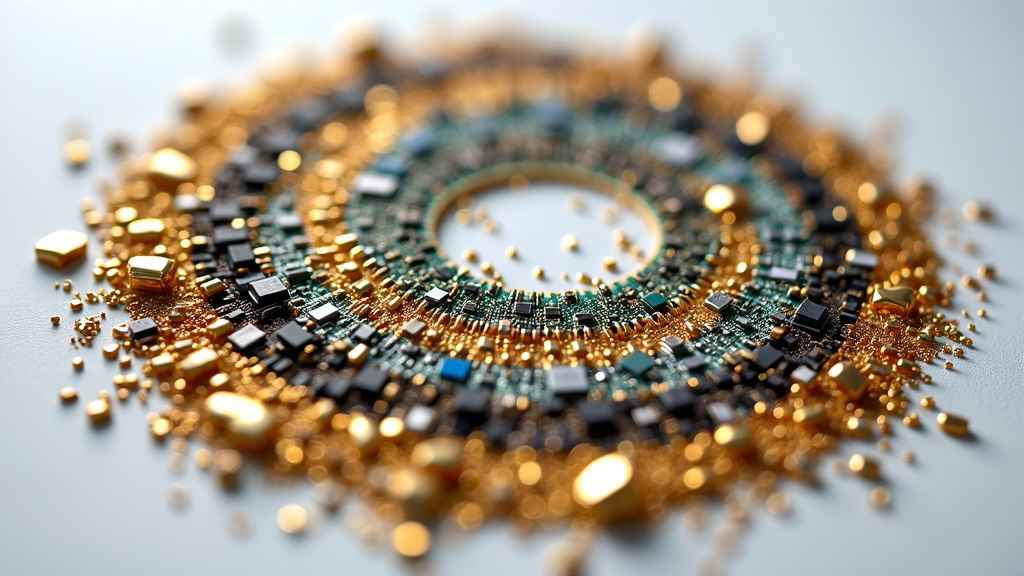5901 Botham Jean Blvd, Dallas, TX 75215
Introduction to Rare Metal Recycling Partnerships
February 19, 2025Recycling just one ton of rare earth elements can prevent the emission of 1.5 tons of carbon dioxide. This statistic highlights the significant impact of rare metal recycling partnerships in our pursuit of a sustainable future.
As technology advances, it also generates large amounts of electronic waste. Rare metal recycling partnerships are becoming key players in promoting sustainability and resource efficiency. These collaborations are changing how we recycle valuable metals like copper and silver, transforming waste into opportunities.
Leading this green initiative are companies like Okon Recycling, whose century-long expertise sets new industry standards. With a state-of-the-art facility in Dallas, Texas, Okon demonstrates how experienced firms can advance recycling initiatives. Their innovative approach processes not only common recyclables but also materials often deemed unrecyclable, such as construction chillers and industrial magnets.
These partnerships are about more than waste reduction; they involve rethinking our entire approach to resource management.
Innovative Technologies in Metal Recycling

The metal recycling industry is experiencing a technological transformation. Advanced recycling technologies are significantly enhancing metal recovery rates and increasing the value of recycled materials. Two key innovations leading this change are AI-driven sorting systems and hydrometallurgical processes.
Artificial intelligence and machine learning have introduced a new level of precision in metal sorting. AI-powered systems can now quickly classify metal alloys using techniques like near-infrared spectroscopy and X-ray fluorescence, allowing for accurate sorting, reducing contamination, and increasing the purity of recycled metals.
Robotic arms with AI algorithms and advanced sensors are taking on complex sorting tasks previously done manually. These automated systems can identify, pick, and sort scrap materials at remarkable speeds. This not only boosts efficiency but also enhances worker safety by reducing exposure to hazardous materials.
Hydrometallurgical Innovations
In chemical processing, hydrometallurgical techniques offer cleaner, more energy-efficient alternatives to traditional methods like smelting. These processes use chemical reactions in liquid solutions to extract and separate metals, proving especially valuable for recycling rare earth elements, crucial in many high-tech products.
Rare Element Resources is one company applying hydrometallurgy. They have developed an innovative rare earth recovery technology that has successfully produced separate rare earth oxides in pilot-scale testing, demonstrating substantial economic and environmental benefits over traditional methods.
Driving Sustainability
These technological innovations are vital for enhancing the sustainability of the metal recycling industry. AI-driven sorting allows for more efficient recovery of valuable metals from complex waste streams, while hydrometallurgical processes can significantly reduce the energy consumption and emissions associated with metal recycling.
Urban mining, the practice of recovering metals from electronic waste and urban infrastructure, is gaining momentum thanks to these advanced technologies. With the increase in discarded electronics and the growing demand for rare earth elements, urban mining provides a sustainable alternative to traditional mining practices.
As these technologies advance, they promise to play a crucial role in creating a more circular economy for metals. By maximizing recovery rates and minimizing environmental impact, innovative recycling technologies are helping to ensure a more sustainable future for the metal industry.
| Aspect | AI-driven Sorting | Hydrometallurgical Processes |
|---|---|---|
| Technology | AI, sensors, robotics | Chemical reactions in liquid solutions |
| Efficiency | High precision sorting, increased purity | Energy-efficient, fewer pollutants |
| Applications | Identifying and separating metal alloys | Extracting and separating rare earth elements |
| Environmental Impact | Reduces contamination, improves worker safety | Reduces energy consumption and emissions |
Building a Sustainable Supply Chain through Partnerships

As the electric vehicle (EV) and renewable energy sectors rapidly evolve, sustainable supply chains are becoming increasingly crucial. Collaborative partnerships between industry leaders are fostering a circular economy, benefiting both businesses and the environment.
A notable example of this collaboration is the partnership between Cyclic Materials and major companies in the EV and renewable energy sectors. These alliances are not merely about business growth; they fundamentally reshape our approach to resource management and sustainability.
The Power of Closed-Loop Recycling
Central to these partnerships is closed-loop recycling, an approach ensuring that critical metals used in EV batteries and renewable energy systems are recovered and reused, avoiding landfills. The benefits include reducing the environmental impact of manufacturing and decreasing reliance on new resource extraction.
According to a study published in Nature, closed-loop recycling of EV batteries can recover up to 95% of materials needed for new battery production. This conserves precious resources and significantly reduces the carbon footprint associated with battery manufacturing.
Environmental and Economic Advantages
The environmental benefits of these partnerships extend beyond resource conservation. By creating a sustainable supply chain, companies reduce carbon emissions and minimize waste, aligning with global climate change efforts.
Economically, these collaborations are impactful. The battery recycling market is projected to reach $11.83 billion by 2030, highlighting significant financial opportunities. Investing in recycling infrastructure secures supply chains and taps into a growing market.
Driving Innovation in Supply Chain Management
These partnerships drive innovation in supply chain management. As companies collaborate on efficient recycling processes, they also advance battery technology and manufacturing techniques, keeping the EV and renewable energy industries sustainable.
Moreover, these collaborations foster knowledge sharing and best practices across industries, creating a wealth of shared expertise that benefits the entire sector.
Challenges and Future Outlook
Despite clear benefits, challenges remain. Scaling up recycling operations to meet EV and renewable energy demand is significant, along with ensuring consistent quality in recycled materials and navigating regulatory landscapes.
However, the future is promising. As more companies value sustainable supply chains, these partnerships will likely increase, crucial for building a circular economy in the EV and renewable energy sectors.
In conclusion, partnerships like those between Cyclic Materials and major industry players are more than business arrangements; they are blueprints for a sustainable future. By focusing on closed-loop recycling and sustainable supply chain management, these collaborations drive positive change across industries, paving the way for a greener, more sustainable world.
Conclusion: The Future of Rare Metal Recycling Partnerships

Rare metal recycling partnerships are key to a sustainable future, offering efficient resource utilization and significant waste reduction. These collaborations minimize reliance on mining, reduce environmental impact, and ensure critical materials remain in circulation.
Companies like Okon Recycling play a vital role in this effort, leveraging advanced recycling technologies and forging strategic alliances to drive a circular economy. By continuously recovering and repurposing rare metals, these initiatives strengthen supply chains, support economic resilience, and reduce dependence on volatile raw material markets.
Global success stories in Japan and the EU prove that when businesses, researchers, and policymakers unite, significant progress can be made in recovering valuable materials from electronic waste. Now is the time for industries to embrace sustainable partnerships, invest in recycling innovations, and commit to circular economy principles.
At Okon Recycling, we are dedicated to helping businesses enhance their environmental impact through cutting-edge metal recycling solutions. Join us in shaping a greener future—contact us at 214-717-4083 to explore how our recycling partnerships can benefit your operations and the planet.
